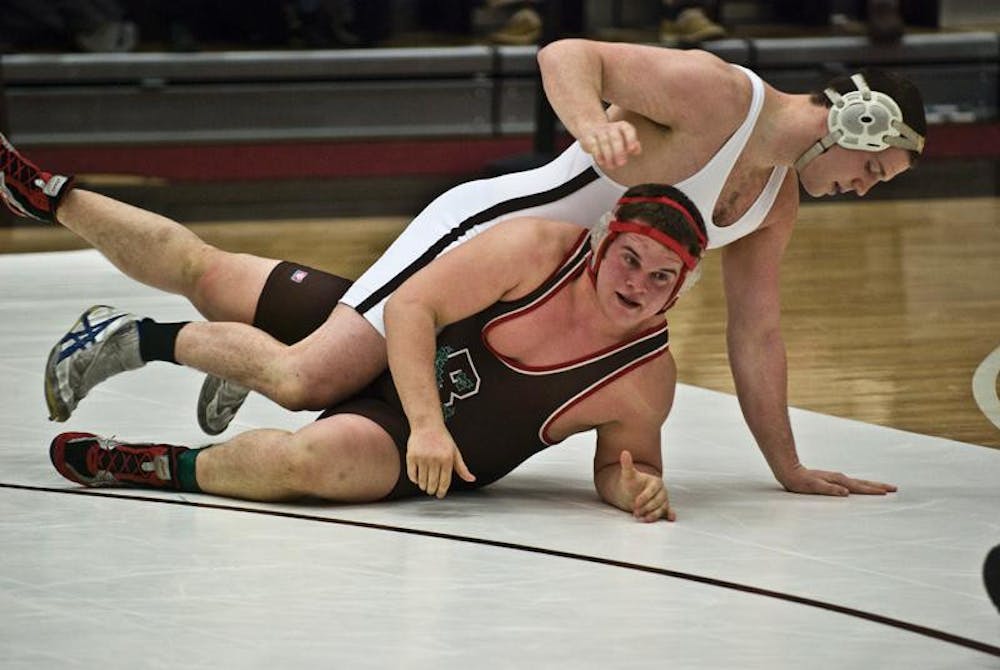After nearly six months of contentious debate over the prospect of cutting the ski, fencing and wrestling programs, President Ruth Simmons recommended yesterday that the Corporation, the University's highest governing body, keep all three programs this year.
In a report sent to the Brown community yesterday at noon, Simmons wrote that the continued presence on campus of the three programs initially targeted for elimination by the Athletics Review Committee in April should be dependent on the teams' ability to raise enough money over the next year to be self-funded. Simmons wrote that the teams should cover "no less than 100 percent" of their budgets with existing contributions from the Department of Athletics and new donations from alums and other outside sponsors.
"I think it's fabulous," said Director of Athletics Michael Goldberger, who called the recommendations "balanced."
In her report, Simmons not only made recommendations on the three programs, but also expounded on an overarching vision for the future of the athletics department.
Simmons also proposed that admissions slots for athletes — which currently constitute about 13 percent of each matriculating class — should be reduced from 225 to 205 slots, a 9 percent decrease. But Simmons also recommended increasing the amount of money budgeted to matching financial aid offers from other Ivy League universities. The two recommendations, if implemented together, would make it easier for Brown coaches to recruit athletes that might be attracted by better financial aid packages at other Ivies, but would restrict the number they could recruit.
"Obviously as a coach and someone that feels that a student-athlete is like any other student on campus, it's a shame," said wrestling Head Coach Dave Amato. "But at least we're only losing 20 (spots) instead of 30." In April, the review committee proposed reducing the number of spots for recruited athletes to 195, a 13 percent decrease.
In another move to make student-athletes more representative of the general student body, Simmons also recommended the next recruiting class meet stricter academic standards, including higher grade point averages and standardized test scores.
To further increase Brown's ability to compete with other Ivy League schools, Simmons suggested increasing coaches' salaries across the board. She also recommended the University should look to pay men and women more equally in the department. At Brown, female head coaches' salaries are on average 26 percent less than those of their male counterparts, according to information compiled by the Office of Postsecondary Education.
Simmons' report also recommended a plan initially proposed by Goldberger that would aim to raise $42 million across all sports. Under the plan, each team would be responsible for meeting its own fundraising goals, which would be established by the department. The Brown University Sports Foundation currently raises about $3.2 million each year, according to Amato.
The fundraising goals for each team have not yet been established. "I'm hopeful we'll be able to do it," said Michael LeBlanc, head coach of the skiing program. "We'll just have to work pretty hard and see what we come up with."
Simmons also wrote that she will support a $10 million campaign to raise the funds recommended in the original report for the improvement of athletics facilities, especially the field hockey field.
But Simmons admitted that it is a difficult time to set bold fundraising goals. "The ambitious goals and strict time line in the report may not be possible in the current economic environment," she wrote.
Simmons wrote that the plan would be most effective if the University agreed not to cut the athletics budget over the next five years. "In this way, donors will be better incentivized to make gifts to support athletics," she wrote.
The report also suggested a new process that would give academic administrators more influence over athletics. The dean of the College and the vice president for campus life and student services should meet with the dean of admission "on a regular basis" to discuss whether athletics is appropriately fitting into the overall mission of the University.
"My reaction was great admiration for President Simmons," said fencing Head Coach Atilio Tass. "Probably we will have now a better and more dynamic and even a strong athletic department."
—With additional reporting by Jake Comer and Ashley McDonnell

ADVERTISEMENT




